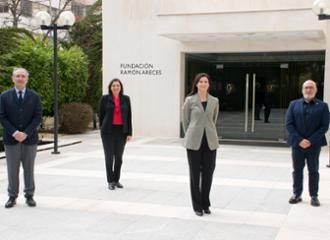Research projects
Start of main content
Study of the impact of genetic polymorphisms in the toxicity of the antiretroviral drugs used to treat HIV
14th national competition for scientific and technical research
Genetic and pharmacogenetic markers

Senior Researcher : Sonia María Rodríguez Nóvoa
Research Centre or Institution : Hospital Carlos III. Madrid.
Abstract
This project falls within the framework of pharmacogenetics applied to HIV research. Over the last few years, HIV treatment has become extremely effective, enabling patients who previously had limited expectations of survival due to HIV infection and the development of AIDS to become chronic patients. However, the treatment of infection carries a high price in quality of life for many patients. In some cases, treatments have to be changed due to the adverse side effects of the antiretroviral drugs and sometimes it is even necessary to treat the symptoms derived from HIV treatment. The aim of this project is to identify the genetic factors associated with the high risk of side effects in patients, to identify this subgroup of patients and modify the therapy so as to enable us to personalise the treatment. This research will study some of the most significant adverse side effects of treatments, such as nephrotoxicity caused by tenofovir, severe hyperbilirubinemia caused by atazanavir and hypersensitivity to abacavir. These drugs are frequently used as part of antiretroviral treatment, making it necessary to find the factors that help to predict the development of toxicity, in order to personalise the treatment. This would improve the quality of life of patients and reduce healthcare costs related to treatment of the adverse side effects. Pharmacogenetic research is much more advanced in other fields, such as oncology, where it has already demonstrated its great usefulness. However, it is just starting out in the area of antiretroviral treatment. Due to the large quantity of HIV treatment drugs that exist, it is necessary to optimise treatment. This goal can be achieved using pharmacogenetic markers that help us to decide which treatment is the most suitable for each patient, thus avoiding the appearance of side effects.
-
 Activities related
Activities related
-
 Projects related
Projects related
-
 News related
News related
-
 Publications related
Publications related
 Activities related
Activities related
-
26
Sep
2022
Conference Terapia génica y celular avanzada… Más allá de la última frontera Madrid, Monday, 26 September 2022, 19:00 hours
-
20
Apr
2023
Session Mujeres científicas en el ámbito farmacéutico Madrid, Thursday, 20 April 20223, 19:00 hours
-
9
May
2024
Conference Genes de mosca y genes humanos: una comparación Madrid, Jueves 09 de mayo de 2024, 19:00 horas
 Projects related
Projects related
- Synthetic nanoparticles as an innovative treatment for sepsis (SPRINT-4-SEPSIS) 2018 Senior Researcher : Antonio Artigas Raventós Research Centre or Institution : Instituto de Investigación e Innovación Parc Taulí (I3PT), Corporación Sanitaria i Universitaria Parc Taulí
- Risk Assesment of Bacterial Sepsis using multiomic and bioinformatics tools: an approach towards the Precision Medicine in Infectious Diseases 2018 Senior Researcher : María Teresa Coque González
- Extracellular vesicles biomarkers for the diagnosis and prognosis of post-surgical septic shock 2018 Senior Researcher : Eduardo Tamayo Gómez Research Centre or Institution : Hospital Clínico Universitario de Valladolid
 News related
News related
-

Eric D. Green: “La genómica debe integrarse en la medicina convencional”
Published on 03/12/2021
 Publications related
Publications related
End of main content




